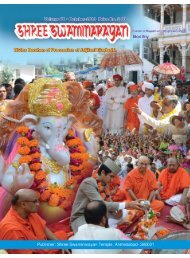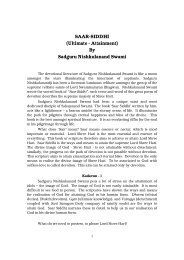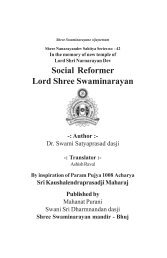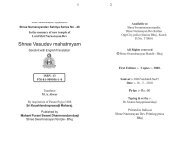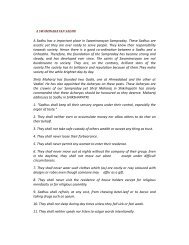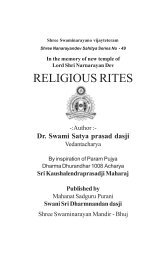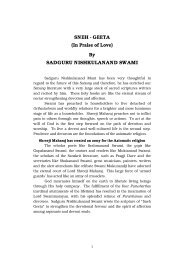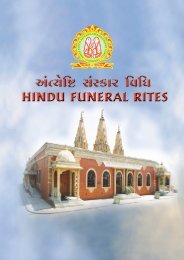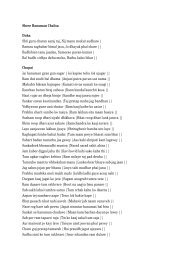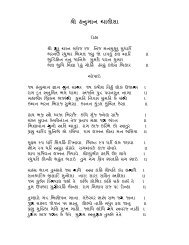May 2013 / May 2013 - Shree Swaminarayan Temple Bhuj
May 2013 / May 2013 - Shree Swaminarayan Temple Bhuj
May 2013 / May 2013 - Shree Swaminarayan Temple Bhuj
Create successful ePaper yourself
Turn your PDF publications into a flip-book with our unique Google optimized e-Paper software.
Mama, one night of Sutak should be observed.’<br />
‘Death of a person of the same Guru or a<br />
person one has contact with need only bathe<br />
with their clothes to free themselves of Sutak.’<br />
‘if a daughter’s son or sister’s son dies<br />
before Yagnopavit (wearing of sacred thread)<br />
then three day Sutak is observed, else Pakshini<br />
Sutak is observed. If the child is with family such<br />
as a Mama then Pakshini is observed. If child is<br />
far away then one day is observed.’<br />
‘If a pious Brahmin dies at one’s own house<br />
then three night of Sutak are observed. If he<br />
dies in the town then one night is observed.’ in<br />
this way Sutak is to be observed according to<br />
country, time and ability.’ Shatanand explains<br />
that the duration of Sutak is also dependant on<br />
the age of the person who dies.<br />
Ujntouchability is now outlined one should<br />
not touch those who are observing the Sutak of<br />
Death. Also if the birth of a child is found out<br />
after ten days then Sutak need not be observed.<br />
In Parashar Madhav, Deval explains, ‘In birth<br />
Sutak, once the days of Sutak have passed,<br />
one need not observe Sutak.’ this is not the<br />
case with Sutak of death thought. Vrudh<br />
Vaishista explains, If one finds out about the<br />
death after six months, then Pakshini should b<br />
observed. If after nine months then one day and<br />
if more, then one needs only to bathe to purify<br />
themselves.’<br />
the above applied if death occurs in the<br />
same country. For death overseas, one need<br />
lonely bathe. Brihaspati clarifies ‘overseas’:<br />
‘Deshantara (overseas) applied if there is a<br />
large river in the middle, if there is a range of<br />
mountains in between or if the language<br />
changes between the areas.’<br />
however, this dose not apply to the death of<br />
one’s mother or father: Smrutyarthasr explains,<br />
‘Even if the death of one’s mother or father<br />
occurs in some distant country and one hears<br />
about it after a year, their sons should still<br />
observe the Sutak for the full ten days. Similarly<br />
husbands and wives should also perform the<br />
full teen-day Sutak in the event of death of their<br />
partner.’ Hemadri and Linga Purana explain,<br />
‘Vairagis and Yogis need not observe Sutak. In<br />
the event of death of their mother, father or<br />
Guru, they should bathe only.’ Sadhus should<br />
also in this way observe Sutak.<br />
Now is explained the situation where<br />
another Sutak strikes when one Sutak is being<br />
performed. Yama in Parashar Madhva<br />
explains, ‘If a birth Sutak strikes when another<br />
birth Sutak is being observed then the first<br />
Sutak purifies the second Sutak (therefore<br />
MAY-<strong>2013</strong> • 07<br />
need not be observed). Similarly a death Sutak<br />
during a death Sutak can be resolved.<br />
However, a death Sutak during a birth Sutak<br />
cannot be resolved in this way and so the full<br />
death Sutak needs to be observed. Similarly if a<br />
three-day Sutak comes during a ten-day Sutak<br />
then the three-day Sutak is resolved but it a ten<br />
day Sutak has to be observed fully.’<br />
Kurma Purana explains exemptions to<br />
Sutak, ‘Naistikas (the devotes), Vaanprastas<br />
(retired), yatis (ascetics), Brahmancharis<br />
(celibates) and Satpurushas (men of truthful<br />
qualities) have to Sutak outlined for them.<br />
Similarly the degenerated (Patita) have to<br />
Sutak. There is also no Sutak for those that die<br />
in a battle.’ ‘In times of Dukala (famine), one<br />
need only bathe to resolve Sutak.’ Daksha in<br />
Sudhiratnakar explains, ‘These Sutaks are for<br />
times of Svastha Kaala (able, fortunate). During<br />
Apatkaala (calamity) Sutak is void.’<br />
Trinsachloki explains, ‘If Sutak strikes for<br />
those with Satra (a period of 2-14 weeks when a<br />
Yagna is performed), those observing a Vrata, a<br />
king, a minister, a sacrificial priest (Brahmin),<br />
one with excelled learning, a doctor, a<br />
professional, an architect, an ill person, a poet,<br />
a washer and one who makes mats, then one<br />
needs to only bathe.’<br />
‘If Sutak occurs whilst one performs Daan<br />
(donation), Upanayan (wearing of sacred<br />
thread), Yagna (sacrifice), Pratishta Vidhi<br />
(installation ceremony), Chaul (removing of<br />
hair), Tirtha Yatra (pilgrimage), goes overseas<br />
to earn money, Japa (chanting), Lagna<br />
(wedding) or Utsav (celebrations), then one<br />
needs to only bathe to purify themselves.’<br />
it is important that we use this information<br />
and make sure we observe the Sutak<br />
appropriately. I’m sure we’ve all questioned<br />
whether we need to observe Sutak or bathe in<br />
the event of a death of a relative in the past.<br />
Here Shatanand has given us specific<br />
information and so it is our duty to understand<br />
this and observe the Sutak. All too often we<br />
disregard the mother’s side of the family and do<br />
not observe Sutak when clearly we should.<br />
There is a lot of information in this Sloka and a<br />
lot of it may be confusing, as it is not clear what<br />
we should observe. In such situation you should<br />
consult with a Sadhu or someone who is well<br />
versed in these issues. If in doubt the 110-day<br />
Sutak should be observed as initially stated by<br />
Lord <strong>Swaminarayan</strong>. Shatanand explains that<br />
he will explain prohibitions of Sandhya<br />
Vandana etc. during Sutak later.



